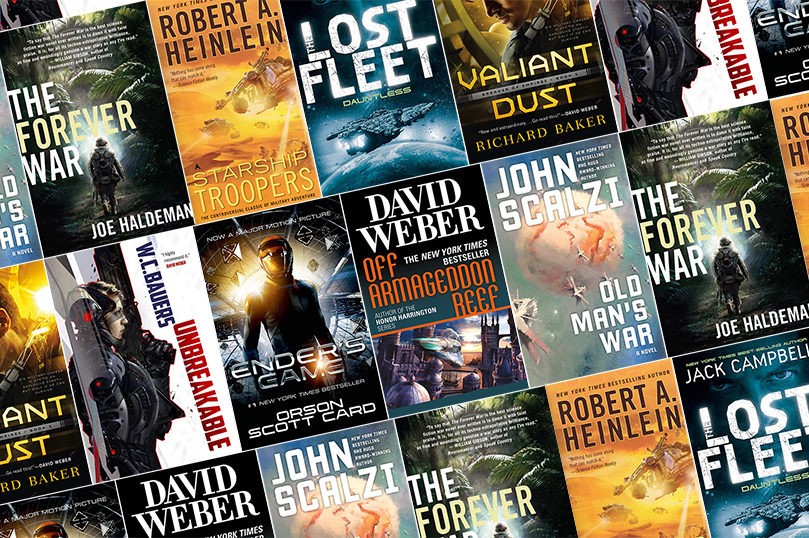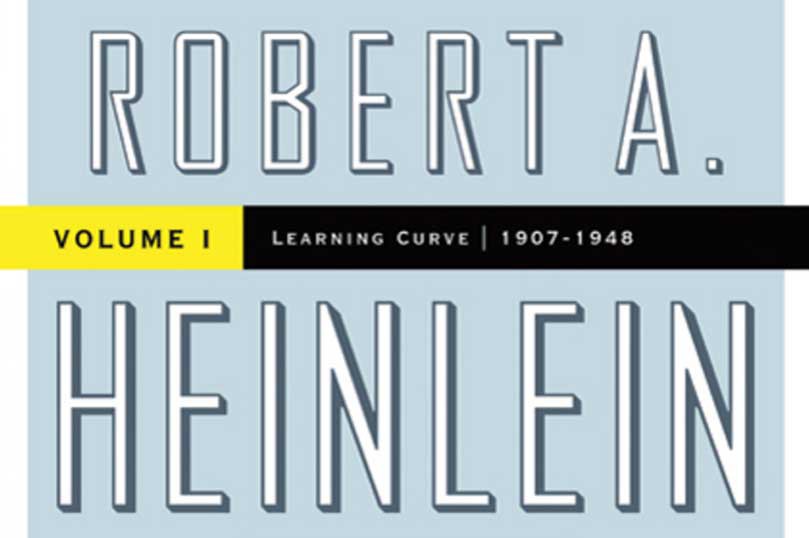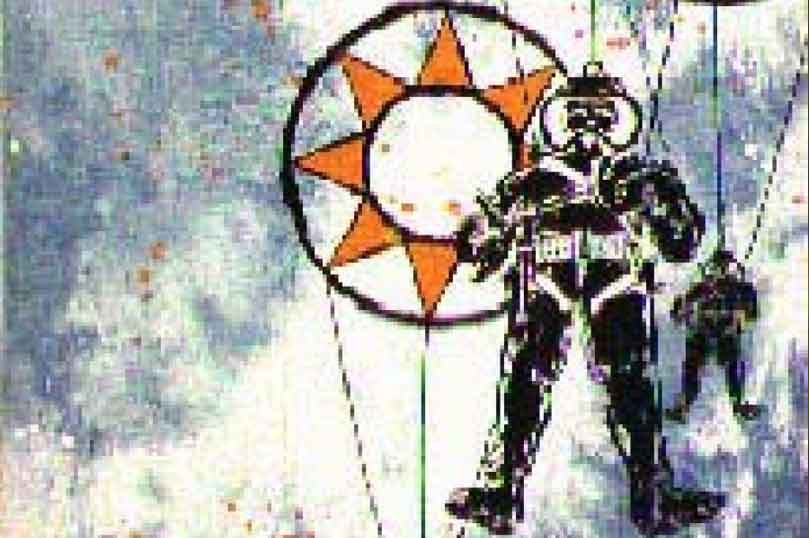Ready, set, action! We’re obsessed with military sci-fi. If you’re ready to go on an adventure filled with aliens, terrifying technology, dangerous weapons, and even pirates, these books are for you. Here are some of our favorites, ranging from classic military sci-fi everyone should read to new and upcoming novels destined to become classics in their own right one day.
Off Armageddon Reef by David Weber
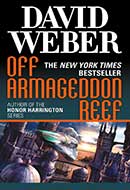 The Gbaba aliens destroyed nearly all of humanity. The few survivors have fled to Earth-like planet Safehold. However, because the Gbaba can detect any industrial emissions, the people on Safehold must regress to an earlier medieval time. Using mind control technology, the government on Safehold imposes a religion that every citizen believes in — a religion that keeps them safe. 800 years pass, and an android awakens to spur a technological revolution… and likely war. Off Armageddon Reef is just one of David Weber’s many impressive science fiction works.
The Gbaba aliens destroyed nearly all of humanity. The few survivors have fled to Earth-like planet Safehold. However, because the Gbaba can detect any industrial emissions, the people on Safehold must regress to an earlier medieval time. Using mind control technology, the government on Safehold imposes a religion that every citizen believes in — a religion that keeps them safe. 800 years pass, and an android awakens to spur a technological revolution… and likely war. Off Armageddon Reef is just one of David Weber’s many impressive science fiction works.
Valiant Dust by Richard Baker
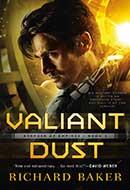 When David Weber praises a sci-fi novel, it moves to the top of our reading list, and he calls Valiant Dust “new and extraordinary.” Baker drew on his background as a U.S. Navy officer to create an exciting tale of war and action set in space. The novel takes place aboard a starship led by gunnery officer Sikander Singh North, who, when faced with a planetary uprising, must prove to himself and his crewmates that he is the right man for the job.
When David Weber praises a sci-fi novel, it moves to the top of our reading list, and he calls Valiant Dust “new and extraordinary.” Baker drew on his background as a U.S. Navy officer to create an exciting tale of war and action set in space. The novel takes place aboard a starship led by gunnery officer Sikander Singh North, who, when faced with a planetary uprising, must prove to himself and his crewmates that he is the right man for the job.
Starship Troopers by Robert A. Heinlein
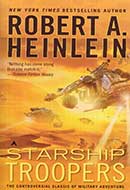 In this adventure-packed military sci-fi classic, lead character Juan “Johnnie” Rico leaves his privileged life to join the military in its fight against an alien species known as the “Bugs.” As philosophical as it is fantasy, Starship Troopers was written in response to the politics of the Cold War and 1950s America. If you’re looking for a novel that strongly has plenty of action but also deals in real-world moral issues, then this book is a great option.
In this adventure-packed military sci-fi classic, lead character Juan “Johnnie” Rico leaves his privileged life to join the military in its fight against an alien species known as the “Bugs.” As philosophical as it is fantasy, Starship Troopers was written in response to the politics of the Cold War and 1950s America. If you’re looking for a novel that strongly has plenty of action but also deals in real-world moral issues, then this book is a great option.
Old Man’s War by John Scalzi
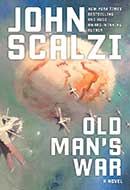 In The Old Man’s War series, interstellar space travel has led to territory wars with alien species. These wars are fought by elderly volunteers of retirement age, whose consciousness, along with their knowledge and skills, are transferred to younger bodies.. John Perry, the protagonist, has chosen to enlist on his 75th birthday, in the hopes that he will receive a homestead stake in one of the colony planets if he survives his two-year tour. This Hugo-award nominee is an enjoyable and thought-provoking series that provides a fresh interpretation of humanity’s future.
In The Old Man’s War series, interstellar space travel has led to territory wars with alien species. These wars are fought by elderly volunteers of retirement age, whose consciousness, along with their knowledge and skills, are transferred to younger bodies.. John Perry, the protagonist, has chosen to enlist on his 75th birthday, in the hopes that he will receive a homestead stake in one of the colony planets if he survives his two-year tour. This Hugo-award nominee is an enjoyable and thought-provoking series that provides a fresh interpretation of humanity’s future.
Unbreakable by W. C. Bauers
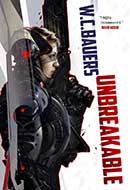 Promise Paen reluctantly returns to her birth planet of Montana to lead the Republic of Aligned Worlds’ Marines infantry, sent to Montana to stabilize the region from pirate raids. Haunted by her past and none too pleased to be back on her home planet, Promise has her work cut out for her. When the marines appear depleted, RAW’s rival, the Lusitanian Empire, is all too eager to take advantage. This suspense-filled, action-packed novel is W. C. Bauers’ wonderful debut.
Promise Paen reluctantly returns to her birth planet of Montana to lead the Republic of Aligned Worlds’ Marines infantry, sent to Montana to stabilize the region from pirate raids. Haunted by her past and none too pleased to be back on her home planet, Promise has her work cut out for her. When the marines appear depleted, RAW’s rival, the Lusitanian Empire, is all too eager to take advantage. This suspense-filled, action-packed novel is W. C. Bauers’ wonderful debut.
Dauntless by Jack Campbell
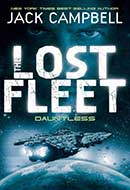 Captain John “Black Jack” Geary has been in survival hibernation in enemy territory for over a century. While in hibernation, the captain is heroized in the Alliance for facing the Syndics in his “last stand.” Now, Geary wakes up to end the war once and for all. He aids a depleted Alliance fleet that is stranded on the Syndics’ territory, and sets forth on a mission to bring back the stolen hypernet key: the Alliance’s last chance at winning the war. If you enjoy Dauntless, check out the rest of the Lost Fleet series, which are equally as exciting.
Captain John “Black Jack” Geary has been in survival hibernation in enemy territory for over a century. While in hibernation, the captain is heroized in the Alliance for facing the Syndics in his “last stand.” Now, Geary wakes up to end the war once and for all. He aids a depleted Alliance fleet that is stranded on the Syndics’ territory, and sets forth on a mission to bring back the stolen hypernet key: the Alliance’s last chance at winning the war. If you enjoy Dauntless, check out the rest of the Lost Fleet series, which are equally as exciting.
Ender’s Game by Orson Scott Card
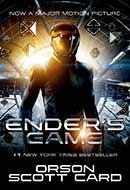 The award winning Ender’s Game series is one of the most well-known science fiction novels for a reason — Orson Scott Card creates a military sci-fi masterpiece using beautifully simple prose. Set in a time when Earth is at war with an alien species, Ender’s Game is about a young genius, nicknamed Ender, who is grouped with other skilled children to go through rigorous military training to prepare for a third alien invasion. Ender and his friends think they are playing video game simulations… but these “games” have much more dire consequences.
The award winning Ender’s Game series is one of the most well-known science fiction novels for a reason — Orson Scott Card creates a military sci-fi masterpiece using beautifully simple prose. Set in a time when Earth is at war with an alien species, Ender’s Game is about a young genius, nicknamed Ender, who is grouped with other skilled children to go through rigorous military training to prepare for a third alien invasion. Ender and his friends think they are playing video game simulations… but these “games” have much more dire consequences.
The Forever War by Joe Haldeman
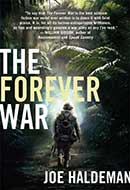 A science fiction classic and winner of the Nebula, Hugo, and Locus awards, The Forever War is about physics student William Mandella who is drafted into the army to fight in a thousand-year war on a faraway planet. When Mandella finally returns home, he finds that what felt like two years in space was nearly 30 years on Earth — and nothing seems to be the same. The Forever War is a captivating story about war, time dilation, death, and survival.
A science fiction classic and winner of the Nebula, Hugo, and Locus awards, The Forever War is about physics student William Mandella who is drafted into the army to fight in a thousand-year war on a faraway planet. When Mandella finally returns home, he finds that what felt like two years in space was nearly 30 years on Earth — and nothing seems to be the same. The Forever War is a captivating story about war, time dilation, death, and survival.

